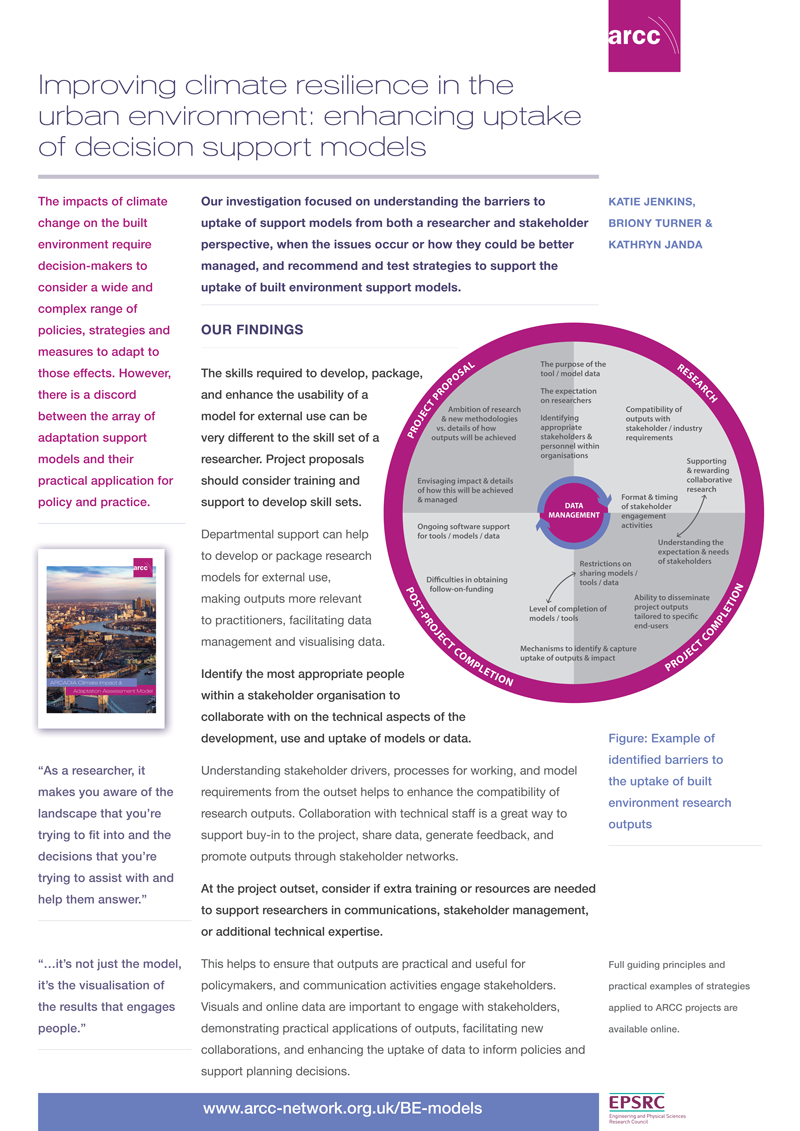Helping researchers to enhance uptake & use of built environment models
Many research projects aim to provide models, visualisation tools, or data for stakeholder use as part of their final outputs. In reality, few manage to transition their ideas into a format that is usable after the project is complete.
Through a desktop review, webinars and discussions with researchers, we have produced guidance on how to ensure consideration of models and data is included throughout a research project.
- See our Model & data guide
- Download the full report Improving climate resilience in the urban environment: Enhancing the uptake and use of building-scale to city-scale decision support models by policymakers and industry (pdf, 5.2 MB)
- Downloadable summary of recommendations to help the provision and uptake of research models, tools and data (pdf, 50 KB)
- Go to our webinar recording
- Go to a presentation from workshop at Royal Meteorological Society annual conference 2017
Webinar
Our webinar focuses on enhancing the uptake, utility and value of simulation models and data at the building-, suburban- and city-scale. In many cases, these models and datasets, developed in EPSRC-funded research projects, have limited practical use at present due to difficulties in both accessing and using complex models by academics and non-academics, data management challenges, and integrating outputs with existing stakeholder capabilities, systems and approaches.
The webinar is geared towards researchers with an interest in the built environment who are involved in the development, use, or management of projects using built environment models and tools, and who have an interest in enhancing model uptake and usability. It will highlight some of the issues, skills gaps and barriers which prevent research outputs from being more industry-ready. Two case studies will provide recommendations and learning points which could be used by research projects.
The webinar covered case studies on:
- The ARCADIA Impact Model, which supports climate-related risk assessment and appraisal of adaptation options across Greater London, and provides an example of the processes and benefits of making model code and outputs available online.
- The DM4T data management tool, MetaMaker, which was developed to add metadata to .csv files of building energy data, to allow users to query across data sources from different institutions.
More about MetaMaker
Background
Dr Katie Jenkins, ARCC network / University of Oxford (with Briony Turner)
Enhancing the uptake of built environment and city simulation models
The aim of this project is to investigate and understand the current challenges and barriers, and ultimately provide a set of guiding principles to inform both stakeholders and researchers to help ensure data and models from research are suitable for informing policy-making and practice in the future.
Dr Julian Paget, University of Bath,
PI Data Management for TEDDINET using Semantic technologies (DM4T)
This project seeks to address the challenges of how to incorporate data management and legacy into much of (physical) science research. It aims to raise awareness with those who are directly responsible for data management, develop a framework to guide the process of making the choices for how to go about implementing data management, and demonstrate example tools that will enable researchers to bring together and re-analyse data from different projects more easily.
Workshop at Royal Meteorological Society Annual conference 2017
Our workshop brought together professionals from across the weather and climate research, industry, policy communities to think about and inform the role of climate derived data and decision support tools for corporate climate risk disclosure.
Delegates were placed in the roles of critical infrastructure, medical and housing organisations facing mounting pressure from investors to disclose their climate risks. The workshop focused on the risks associated with prolonged interruption to electricity supply resulting from a weather-related shock.
Participants were briefed on changes in climate modelled impacts on utilities and infrastructure, actual impacts experienced by the city of Lancaster, and three research tools focused on modelling and understanding climate risks to urban systems. Working in groups they explored how these tools could be used to inform a revised climate risk disclosure statement for their organisation.
- ITRC – the world’s first national infrastructure system-of-systems model, NISMOD, which has been used to analyse long-term investment interdependencies and strategies for the UK.
- ARCADIA – a system-scale decision support model to support design of improved resilient and adaptable cities. The model provides a system scale understanding of the inter-relationships between climate impacts, the urban economy, land use, transport and the built environment
- DECoRuM – a GIS-based toolkit for carbon emission reduction planning with the capability to estimate current energy-related CO2 emissions from existing UK dwellings, aggregating them to a street, district, sub-urban, and city level.
The workshop ended by testing the guiding principles devised from the ARCC network workstream on enhancing the uptake & use of building-scale to city-scale decision support models.
See the programme for more information (pdf, 1.1 MB)
Useful links
- UNEP Global Framework for Climate Risk Disclosure A unique global partnership of 14 leading institutional investors and other organisations, including UNEP FI, representing trillions in assets released the Global Framework for Climate Risk Disclosure to provide specific guidance to companies regarding the information they provide to investors on the financial risks posed by climate change.
- Task Force on Climate-related Financial Disclosures A framework for climate-related financial disclosure. The task force was commissioned by the G20 to develop voluntary, consistent climate-related financial risk disclosures for use by companies in providing information to investors, lenders, insurers, and other stakeholders.
- Royal Academy of Engineering (2016) Living without electricity: One city’s experience of coping with loss of power
- Urban microclimate: overcoming obstacles to high density resilient cities – an ARCC network event that explored the current state of knowledge and understanding of the various built form-driven effects on urban performance and resilience.


